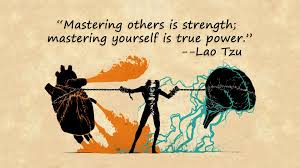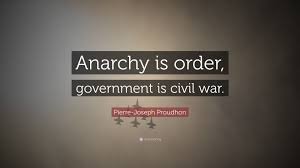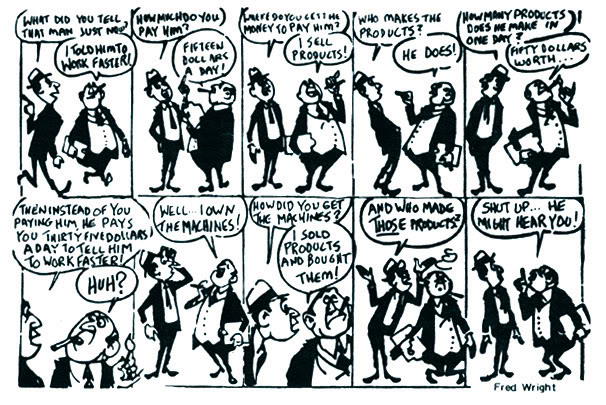Arm chair Anarchy part 1 Taoism(briefly), Proudhon, and market socialism
The term anarchism has it's philosophical roots in old Taoist writings.

The Taoist introduced the first quasi-anarchist themes.
But it wasn't until Proudhon, that we have the first real example of anarchist thought

Proudhon considered Capitalism to be an exploitative mode of production.
Now capitalism is defined as an economic system that has
Private ownership of the means of production(entities that own production facilities that operate on a profit minded basis)
Wage Labor(working for a wage and not the product of your labor)
Acclimation of capital via extraction of surplus value(i'll go more into this later)
A commodity market place
His criticism of capitalism stems from what is known in socialist language as,"exploitation", described in detail by the Labor Theory of value, which was first popularized by Adam Smith in his work,"The wealth of nations", and later developed even further by Karl Marx in his work,"Capital" I plan on doing a whole post about why the subjective theory of value(the value theory purposed by right wing libertarian thinkers) and why it isn't materially based, but lets continue with this history lesson for now.
Now the material reality of exploitation stems from private ownership of the means of production.
Now capitalism and its' material wealth is created by commodities. Commodities are generated by the work of labor. When a commodity is sent to the market for exchange it generates an exchange value. Exchange value minus production cost(the cost of material goods needed to furnish commodities as well as the wages of the workers who actually furnish commodities) equals surplus value.
or
surplus value= exchange value-cost of production
exchange value=quantity of other commodities that the good will be exchanged for(doesn't necessarily mean the price in quantities of medium of exchange)
cost production= cost of material goods+the labor requirements
Surplus value is taken by the bourgeoisie, which is known as profiting.
Picture relevant

Profit of a private enterprise is value taken from the hands of labor, which according to socialism is theft.
Or to quote Proudhon,"If I were asked to answer the following question: What is slavery? and I should answer in one word, It is murder!, my meaning would be understood at once. No extended argument would be required to show that the power to remove a man's mind, will, and personality, is the power of life and death, and that it makes a man a slave. It is murder. Why, then, to this other question: What is property? may I not likewise answer, It is robbery!, without the certainty of being misunderstood; the second proposition being no other than a transformation of the first?"(https://www.marxists.org/reference/subject/economics/proudhon/property/ch01.htm)
Now Proudhon synthesized an economic model which he considered free of exploitation called,"Mutualism"
Mutualism proposed that production facilities should be owned mutually by the laborers who work in said production facilities. Hence the name Mutualism.
Mutualism sees property that is owned by someone but not worked or inhabited by them(a capitalist who owns a factory, or a landlord renting out a house) as exploitative, because, according to the labor theory of value, useful labor is what generates value or as Adam Smith put it,"Labor was the first price, the original purchase - money that was paid for all things. It was not by gold or by silver, but by labor, that all wealth of the world was originally purchased."
Mutualism purposes that a market of socialist enterprise would sell goods at the cost value(or the quantity of goods needed to replace the cost of production) therefore negating the exploitation inherit in the capitalist mode of production, with profitless based exchange, as I pointed out before profit is value taken from the laborer, so with out extraction of surplus value there is no profit.
Since useful labor is what generates value, those who don't do useful labor, yet still profit, are exploitative. Incomes generated from loans, or just simple ownership of such and such thing are living off the backs of the working class. Which is what socialism as a whole is concerned with, rights for the working class, which in some expression of the philosophies does express in the nation state, but the goal of all socialism is to end the nation state.
Anyway, Anarchism was specifically defined by Proudhon as,"Anti-hierarchicalism" meaning that an anarchist society wouldn't necessarily mean that there isn't a state like entity, or rules, or contracts, or leaders, or bosses, but rather a society where the many different individuals inhabiting said society would all be equals on a level playing field.
In fact, Proudhon, considered that some sort of entity would need to exist and I quote,"The Republic is a positive anarchy. It is neither liberty subjected to order, as in the constitutional monarchy, nor liberty imprisoned in order, as the provisional government would have it. It is liberty delivered from all its hobbles, superstition, prejudice, sophism, speculation, authority; it is mutual liberty, not self-limiting liberty; liberty, not the daughter but the MOTHER of order."
Just like how the Anarchists in Spain created a republican form of government. Anarchy does not mean the end of organizations of political bodies, it means a new form of organizations of political bodies. In my view, there will only be a stateless society, when the class war has ended, because the state and its violence is what keep the capitalist class in power. If the capitalist class loses power a state must continue to exist until all forces of reaction are extinguished, then and only then can we consider a stateless society.
Now, Mutualism is considered a none-revolutionary form of socialism, meaning that Proudhon did not support an immediate overthrow of the ruling class, but rather he promoted a gradual creation of a parallel system, that would eventually replace our current system.
A parallel economy, if you will.
With all this being said, this is the historical roots of anarchism, to be anti-hierarchy and to be anti-capitalist.
personally I disagree with Proudhon and much of anarchism, but I'm happy to see this writing on Steemit. When Hivemind comes out with communities, we should have a 'united-front' group.
"I plan on doing a whole post about why the subjective theory of value(the value theory purposed by right wing libertarian thinkers) and why it isn't materially based."
Yeah, me too. I don't understand the appeal of the Austrian school or idealistic explanations of value. It explains nothing. I suppose they just don't realize that.
Oh i'm not a mutualist, I just wanted to do a blog series about the different factions in anarchism and economic topics.
There are parts of mutualism that I think make sense and there are parts that I don't like.
My main concern when writing this post was to have anarcho-capitalist see where anarchism comes from and maybe get what historical anarchism is all about. the majority of the anarchist tag is caps so I thought I'd try and get some actual historical perspective in there, maybe weasel in some dialectics while i'm at it.
I consider myself an Eco-Anarchist actually.
I'll definitely support a united-front type group, solidarity, always.
"I don't understand the appeal of the Austrian school or idealistic explanations of value. It explains nothing. I suppose they just don't realize that."
Seriously, in the first chapter of capital Marx addresses why value isn't subjective, and why it may seem that way upon a very superficial examination. There is so much data supporting the labor theory of value that the Austrian school is just pseudoscience at this point.
There's a term I haven't seen on Steemit yet. I like you